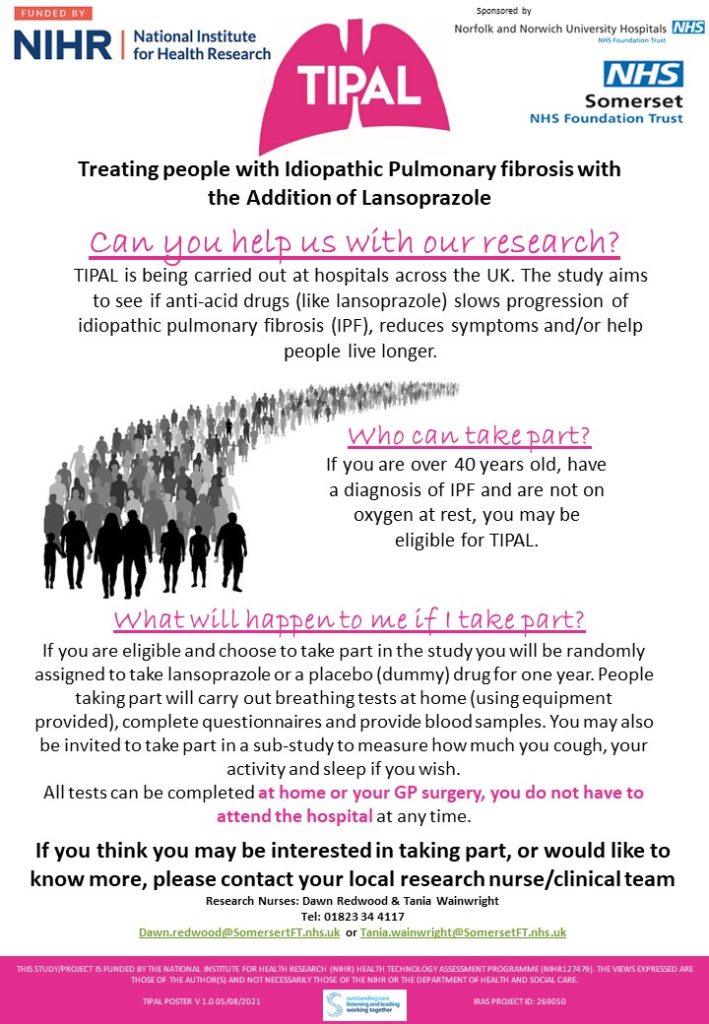Respiratory
The following studies are being carried out at the Somerset Foundation Trust.
ASSESS-MESO
A prospective observational cohort study collecting data on demographics, symptoms and biomarkers in people with mesothelioma that will provide a resource for future trials.
The aim of this study is to collect information about people with mesothelioma over the course of their illness. We want to understand how mesothelioma evolves and progresses and find out whether there are any specific factors that affect outcomes. This study will help us understand more about mesothelioma and how we can improve care for people diagnosed with it.
The study also uses the information collected to identify people who may be eligible to join clinical trials. People who are taking part in ASSESS-meso will be assessed for clinical trials at every study appointment and, if they are eligible, will be invited to hear a bit more information about the trial before deciding whether they want to join up.
Closing date April 2027 – this study is currently OPEN to anyone newly diagnosed with mesothelioma AND who is under regular follow up with the clinical team. The study allows for telephone or virtual appointments if you are not actually coming into the hospital to see someone.
INJUSTIS
This study is looking at patients who have been given a diagnosis of fibrotic lung disease. Specifically, we are asking patients who have been told they have RA-UIP, Asbestosis, Chronic Hypersensitivity Pneumonitis and Unclassifiable Fibrotic Lung Disease or Idiopathic Pulmonary Fibrosis to help us with the study. We are inviting 250 participants like you to take part.
Fibrotic lung conditions result in scarring of the lung tissue. This causes shortness of breath and cough, and has an enormous impact on people’s quality of life. We currently know that progressive lung scarring may be caused by a few conditions like Rheumatoid Arthritis and previous exposure to asbestos, birds (pigeons, parrots and budgies particularly) and moulds. In cases where no cause is found, we sometimes refer to this type of lung scarring as Idiopathic Pulmonary Fibrosis (IPF). However, regardless of whether a cause is found, or not, we do not have a cure.
The aim of these studies is to understand whether patients with progressive pulmonary fibrosis, regardless of the cause, have shared reasons for their disease progression. We will do this by assessing whether the genetic, cellular and chemical signals in the blood of people with IPF and other lung scarring conditions are similar or different. We also need to understand how these conditions change over time. Researchers wish to study the genetic signatures in samples and hope it will lead to a better understanding of why people develop lung fibrosis regardless of its cause and how the disease and its symptoms progress.
https://www.injustisstudy.org/
Screening of target genes for polymorphic variation, which may alter treatment response for airway treatment targets
We are interested in why people get asthma. An important factor contributes to whether people get asthma is the genetic make-up of an individual. However it is unclear which genetic differences are important. The aim of this project is to take DNA from blood or saliva samples in order to look at the genetic variation seen in patients with asthma and work out which genes are important.. These genetic changes may also be important for predicting which asthma patients are likely to benefit from specific drugs also. A blood sample (Serum) is also being collected to see if these genetic changes alter the expression of proteins in the body.
The study will involve one visit to the hospital (this could be as part of a pre-existing hospital appointment) which will last about an hour.
Patients with an asthma diagnosis are asked to participate. Other studies have shown that there are inherited risk factors for asthma and that the severity may also have a strong genetic component. This study is trying to find out which common variants in genes are responsible for this which could help improve asthma treatments/management in the future.
Planned Closing Date: 31/03/2025
Immune-Mediated Inflammatory Diseases
Closing date 30/11/2024

TIPAL
Treating people with Idiopathic Pulmonary fibrosis with the Addition of Lansoprazole
Idiopathic Pulmonary Fibrosis is a disease which results in damage to the lung tissue. It is characterised by progressive loss of lung function (measured by breathing tests) and increasing breathlessness. It is incurable and there are few available treatments. It is thought to occur because of tiny scarring (which we call fibrosis) that develop throughout the lungs.
These breathing tests include spirometry assessments, which measure the amount of air you can breathe out and how fast you can blow it out. Spirometry tests can be carried out at hospital, GP surgeries or your home provided you have the correct equipment and appropriate training. These tests are completed regularly to monitor patient’s lung function.
Previous research suggests that idiopathic pulmonary fibrosis progresses slower if patients regularly take anti-acid drugs (like lansoprazole) and they may be likely to survive longer. Such drugs reduce acid which is thought to cause the scar formation and/or may directly reduce the amount of scar tissue. This is why people are often prescribed these drugs, but we don’t really know if they benefit patients; the aim of our study is to find this out.
We plan to recruit 298 participants with idiopathic pulmonary fibrosis from different regions of the UK. We want to know whether lansoprazole, when given alongside current treatments, slows down the decline in lung function which is associated with idiopathic pulmonary fibrosis.
Closing Date 31/08/2024


